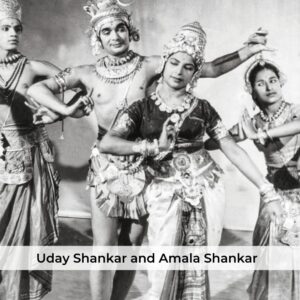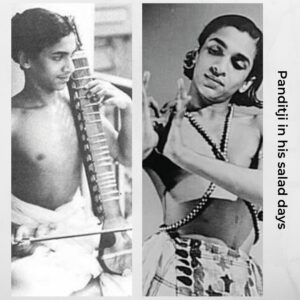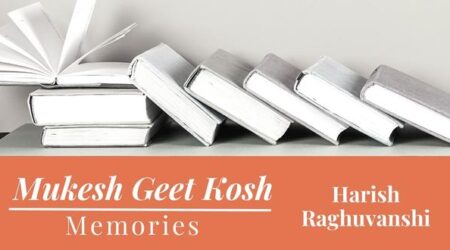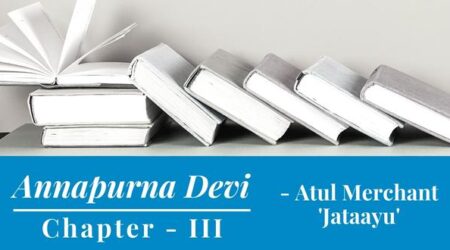I Don’t Teach Sissified Dandies
- Atul Merchant ‘Jataayu’ | merchatul@gmail.com
Ut. Allauddin Khan took charge of Uday Shankar’s orchestra, and the music became a sensation. Between dance performances, when the curtains fell for a change of setting and for dancers to change costumes, Baba filled the time with his solo sarod renditions, as well as his brief renditions of other instruments. These solos transfixed Western audiences, and Baba’s playing soon became a bigger attraction to the audience than the dance performances.
From Baba’s letters to his younger brother Aayatali Khan, and a few others, we get to know many details about Baba’s tour with Uday Shankar’s troupe. Baba was fascinated with European and Middle Eastern music and wrote some notations too in his letters to his nephew Mubarak. In these letters, he also mentioned the troupe’s visits to Egypt, Jerusalem, Palestine (Israel was founded on 14 May 1948, and before that, it was called Palestine), Greece, Austria, Switzerland, Budapest, Vienna, Prague, Germany, Paris, and London. In his letters, Baba lamented about the food problems he faced as he didn’t eat beef or pork. Baba began losing weight and became so weak that Uday Shankar thought about sending him back to India. However, it was a risk to send Baba all alone on such a long journey back. At Uday Shankar’s insistence, Baba remained with them for the entire tour. In his letters, Baba wrote that during the tour his diet was limited to milk, bread, fruits, and boiled vegetables. His earnings on the trip were all exhausted in his lodging and boarding expenses. The net savings from such a long and arduous tour finally amounted to zero. This was true for the other artists as well, including Uday Shankar. Therefore, financially, the tour was an ill-conceived venture.
 Baba’s letters speak of the music he listened to while on tour. Be it Egypt, Palestine, or Jerusalem, he saw music and dance everywhere. Baba wrote, ‘I had heard from our maulvis that music is forbidden in the Arab world but it is wrong. Muslims and non-Muslims all sing and play music. Baba said he heard wonderful music performed both by men and women even at the Bait al-Maqdis (House of the Holiness) Mosque, Jerusalem.
Baba’s letters speak of the music he listened to while on tour. Be it Egypt, Palestine, or Jerusalem, he saw music and dance everywhere. Baba wrote, ‘I had heard from our maulvis that music is forbidden in the Arab world but it is wrong. Muslims and non-Muslims all sing and play music. Baba said he heard wonderful music performed both by men and women even at the Bait al-Maqdis (House of the Holiness) Mosque, Jerusalem.
Readers ought to be reminded that Baba suffered the worst trauma of his life when his elder daughter Jahanara (married to a Muslim family from East Bengal), faced severe hostility from her in-laws. The conservative Muslim in-laws had forbidden her from practicing music. However, because Jahanara was very fond of music and had learned Dhrupad singing from Baba, she would do her riyaaz when she was alone at home.
One day, her mother-in-law, upon returning home, heard Jahanara’s singing. What made things worse was that Jahanara was singing a Dhrupad composition of Shiv Stuti. All hell broke loose for Jahanara. Her tanpurā was burnt, she was declared a kafir, and she was forcibly made to eat beef to prove her fidelity to Islam. When Jahanara refused to eat beef, she was beaten up. Jahanara was pregnant at that time, and the beating caused a miscarriage. She was sent back to Maihar in poor health. After remaining bedridden for a few days, she died. The local doctors found her symptoms resembled that of arsenic poisoning, a mystery that remains unsolved because no autopsy was performed.
One of the members of the tour was Uday Shankar’s youngest sibling, Ravi Shankar, who was around thirteen or fourteen years old at the time. In Baba’s words, ‘विदेश जाते जहाज़ में चढ़ते समय, उदय शंकर की माँ ने मुझसे कहा था, “रवि को मैं आपको सौंप रही हूँ, आज से आप ही उसके बाबा है।” यह सुनकर मैंने पुत्रवत भाव से विदेश में उसे थोड़ी बहुत शिक्षा दी और बाद में मैहर में सिखाया।’ [While boarding the ship, Uday Shankar’s mother told me, “I am entrusting Ravi to your guardianship. Henceforth, you are his father.” Accordingly, I treated Ravi Shankar as my son, and during the long tour, I gave him some music lessons and later on taught him at Maihar.]’
It bears noting that Shyam Shankar Chowdhury, the father of the Shankar siblings, had been murdered in London in 1936. Shyam Shankar had abandoned his first wife, Hemangini Devi, the mother of day Shankar, Rajendra Shankar, Debendra Shankar, Bhupendra Shankar, and Ravi Shankar. Bhupendra died young in 1926.
During this period, the young Ravi Shankar had been occasionally learning music; first from Timirbaran, Vishnudas Shiralee, and Gokul Naag, and later from Baba. However, young Ravi was not focused and he kept switching between the Israj, Sitār, Jaltarang, and vocal lessons. Baba, however, told him that music could not be learned in such a sporadic manner.
Quoting Baba, ‘पहले रवु बिलकुल अनाड़ी था, भांड की तरह नाचता था। स्वभाव भी अच्छा नहीं था। लड़िकयों के प्रति दुर्बलता थी। ठीक प्रजापति का स्वभाव था। [Earlier, Robu (Baba always addressed Ravi as Robu) was rather clumsy. He used to dance like a buffoon. His nature too was not good. Despite his young age, girls were his weakness. He had rajasic (highly self-centered and passionate in the gratification of sensory pleasures) tendencies.]’
In order to understand Ravi Shankar, we need to understand the events of his formative years. His father, Shyam Shankar, abandoned his wife and children and migrated to London, where he married an English woman. Ravi Shankar saw his father very briefly once, for the first time when he was eight years old. Shyam Shankar, however, became the mentor of Ravi’s eldest brother, Uday. While in London, Shyam Shankar became an amateur impresario (a person who organizes and often finances concerts, plays, or operas), introducing Indian music and dance to Britain, and Uday joined him there. Uday danced at a few charity performances his father had organized in London, and on one such occasion, the noted Russian ballerina Anna Pavlova happened to be present. Uday’s encounter with Pavlova had a lasting impact on his career.
 In 1938, Ravi’s mother, Hemangini Devi, died after a prolonged illness. According to the psychologist Prof. Rooshikumar Pandya, the marital discord and estrangement of his parents followed by the traumatic news of his father’s murder and mother’s death, all in quick succession, deeply impacted Ravi Shankar’s psyche and affected his personality and behavior the rest of his life. There were three father figures in Ravi Shankar’s life. First was the elder brother, Uday Shankar, followed by Baba Allauddin Khan, and finally Tat Baba.
In 1938, Ravi’s mother, Hemangini Devi, died after a prolonged illness. According to the psychologist Prof. Rooshikumar Pandya, the marital discord and estrangement of his parents followed by the traumatic news of his father’s murder and mother’s death, all in quick succession, deeply impacted Ravi Shankar’s psyche and affected his personality and behavior the rest of his life. There were three father figures in Ravi Shankar’s life. First was the elder brother, Uday Shankar, followed by Baba Allauddin Khan, and finally Tat Baba.
Pt Ravi Shankar once recalled an early experience with Baba, saying, ‘Baba himself was a deeply spiritual person. Despite being a devout Muslim, he could be moved by any spiritual path. One morning, in Brussels, I brought him to a cathedral where the choir was singing. The moment we entered, I could see that he was in a strange mood. The cathedral had a huge statue of the Virgin Mary. Baba went towards that statue and started howling like a child: “Ma, Ma” (Mother, Mother), with tears flowing freely. We had to drag him out.’
In March 1938, Germany annexed Austria, followed by Czechoslovakia, and then the invasion of Poland led to the start of World War II. Touring Western countries was no longer possible. Uday Shankar’s troupe was forced to cut short their tour and return to India. In 1938, Uday Shankar made India his base, establishing the Uday Shankar India Cultural Centre at Almora, with Baba Allauddin Khan as its music teacher. Many of Udayji’s students later became celebrities, including stellar names like Guru Dutt, Shanti Bardhan, Simkie, Amala, Satyavati, Narendra Sharma, Ruma Guha Thakurta (the first wife of the famous actor-singer Kishore Kumar), Prabhat Ganguly, Zohra Sehgal, Uzra, Lakshmi Shankar, Shanta Gandhi, as well as his own brothers Rajendra, Debendra, and Ravi. This was the time when Ravi Shankar shifted his focus from dancing to music. Baba told him that if he was serious about learning music, he had best come to Maihar and live with Baba’s family in a traditional gurukul-like system in the ancient guru–shishya paramparā by renouncing his Western mindset. Ravi heeded this advice.
Upon reaching Maihar, the first test imposed on young Ravi was when Baba refused to teach him, saying, ‘I don’t teach sissified dandies.’ Young Ravi returned to Baba after shaving his head, proving he was willing to lead the ascetic life of a disciple. Thus, he passed the first test with flying colors. Ravi Shankar’s lodging and accommodation were arranged by renting an adjoining house. ‘After the life of luxury and glamour in the cities of Europe and America, rural Maihar was tough,’ Ravi Shankar admits. His small, rented room was spartan. ‘The doors and windows creaked with the passing wind, and scorpions and cockroaches abounded. Snakes were not rare and jackals howled all night.’ There was no electricity or running water. All his meals were, of course, provided at Baba’s house.
Young Ali Akbar and Ravi became the best of friends. After dinner, Ali would sneak out of his room, jump over the boundary wall, and go to Ravi’s room to indulge in some juvenile mischief. Ravi was not only two years elder to Ali, but also much smarter, wiser, more educated, and with enormous international exposure due to his extensive travels with his brother’s troupe. It was obvious that Ravi had tremendous influence over the unworldly Ali, who had never been out of rustic Maihar. However, there was a trade-off here. Ravi would request Ali to share his notations in reciprocation for Ravi sharing the naughty magazines that he had acquired from Paris and Copenhagen. What was considered ‘naughty’ in the 1930s was quite chaste compared to what our children are exposed to these days, but for young Ali Akbar, those guilt-laden indulgences during his impressionable age had a profound influence on his psyche. Hence, a lifelong relationship of ‘follower’ and ‘dominator’ was formed—Ali Akbar being the former and Ravi Shankar the latter.
Ali Akbar was already a performing artiste at the age of fourteen, while Ravi Shankar was just a beginner at the age of eighteen. The notations and initial rehearsals with Ali Akbar were of tremendous help to the extremely intelligent and focused Ravi as it enabled him to be well prepared for his lessons from Baba. Needless to say, Ravi’s progress was rapid.
‘Genius is composed of 2 percent talent and 98 percent persevering application.’ – Ludwig van Beethoven








Comment (1)
All music-lovers should read this book. They will realize what is perseverance, truthfulness on music, concentration, honesty etc. The presentation is beautiful and innovative. Great book.